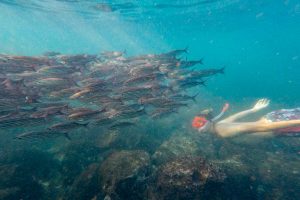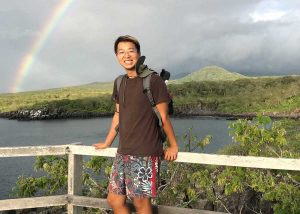Jintong Wu
Jintong Wu ’19 is an Environmental Sciences major who participated in the Galapagos Study Abroad program in Summer 2018 and Spring 2019.
Why did you choose to study abroad in the Galapagos?
I learned about the Galapagos as the natural laboratory for evolution in my biology class. Since then the Galapagos has enchanted me with its relatively well-protected environment and biodiversity. The summer program not only offered classes that can count towards my major but also had great financial support which made it very appealing.
What was the most interesting cultural experience you had abroad?
I think one of the most interesting cultural experiences I had in the Galapagos was having a host family. I didn’t understand their Spanish well, but my host family still fed me a lot of food and took me wherever they went on the island. I really appreciated that they introduced me to their community and let me into their life. Seeing how they spent enormous amounts of time with family members and shared similar life goals, emotions, and cares as people living in the United States and China was especially enlightening: it made me understand how people across cultures connect and how families function similarly but still differently across cultures.
How did your summer experience impact the way you view the world?
My experience in the Galapagos gave me comparative perspectives on environmental issues and challenged my previous westernized perspective on conservation and environmentalism; it rendered me a deeper knowledge of the challenges, conflicts, hope, and prospects of doing conservation and environmental protection in a developing country like Ecuador. Understanding how China, my home country, has an impact on the local environment provided me perspective on how globalization has complicated environmental issues.
Lastly, my life on the island placed me in close proximity to nature, which fostered my appreciation for nature. I started to engage in more outdoor activities after I came back from the Galapagos. During my time in the Galapagos, I was also able to discover the wonderful world underwater and fell in love with diving since then.
What piece of advice would you give a fellow student who is considering studying abroad in the Galapagos?
Go for it. Be prepared to be challenged and have an open mind. You learn so much more in the field about the environment than being in the classroom. Galapagos is an amazing place if you love nature and care about the environment.
What classes did you take while in the Galapagos?
In the Summer, I took two classes: GEOG 110, “Blue Planet/ Tropical Ecohydrology,” and ENVR 430, “Environmental Chemistry.” In the Spring semester, I took 4 classes, “Quantitative Field Ecology,” “Political Ecology,” “Climate Change,” and “Technique of Marine Research II.”
Describe a typical day for you in the Galapagos.
I would go to class in the morning. In the afternoon, I would do some homework, take a nap, go to the beach in the afternoon for snorkeling or hike to Tijeretas or Playa Baquerizo. In the evening, sometimes I would go to the Malecon with my host family and walk around.
If it is Sunday, then it’s Día de Familia which means I would be hanging out with my host family and go wherever they take me. Usually, they take me to their farm or their grandma’s house to relax.
If you could only pack 3 things in your suitcase to prepare you for the Galapagos, what would they be?
Camera, snorkel and fins, and hiking boots.

